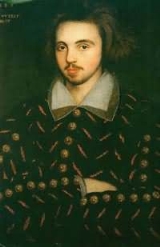
Christopher Marlowe
Christopher Marlowe was an English dramatist, poet and translator of the Elizabethan era.
Sourced
- And let these tears, distilling from mine eyes,
Be proof of my grief and innocency.- Edward the Second (c. 1591).
- My swelling heart for very anger breaks.
- Edward the Second.
- What should a priest do with so fair a house?
A prison may best beseem his holiness.- Edward the Second.
- Who ever loved that loved not at first sight?
- Hero and Leander (published 1598). The same is in William Shakespeare, As You Like It. Compare "None ever loved but at first sight they loved", George Chapman, The Blind Beggar of Alexandria.
- Come live with me and be my Love,
And we will all the pleasures prove
That hills and valleys, dales and fields,
Or woods or steepy mountain yields.And we will sit upon the rocks,
And see the shepherds feed their flocks
By shallow rivers, to whose falls
Melodious birds sing madrigals.And I will make thee beds of roses
And a thousand fragrant posies.- The Passionate Shepherd to His Love (unknown date), stanzas 1 and 2. Compare: "To shallow rivers, to whose falls Melodious birds sings madrigals; There will we make our peds of roses, And a thousand fragrant posies", William Shakespeare, Merry Wives of Windsor, act iii. scene i. (Sung by Evans).
- All they that love not tobacco and boys are fools.
- Remark attributed to Marlowe from the testimony of Richard Baines, a government informer, in 1593
Tamburlaine the Great (published 1590)
- Is it not brave to be a king, Techelles?
Usumcasane and Theridamas,
Is it not passing brave to be a king,
And ride in triumph through Persepolis?- Part 1.
- And sooner shall the sun fall from his sphere
Than Tamburlaine be slain or overcome.- Part 1.
- From jigging veins of rhyming mother wits,
And such conceits as clownage keeps in pay,
We'll lead you to the stately tent of war,
Where you shall hear the Scythian Tamburlaine
Threatening the world with high astounding terms,
And scourging kingdoms with his conquering sword.
View but his picture in this tragic glass,
And then applaud his fortunes as you please.- Part 1.
- Where death cuts off the progress of his pomp
And murderous fates throw all his triumphs down.- Part 2.
- Well, bark, ye dogs; I'll bridle all your tongues.
- Part 2.
- Let Earth and Heaven his timeless death deplore,
For both their worths shall equal him no more.- Part 2.
- Come, let us march against the powers of heaven,
And set black streamers in the firmament,
To signify the slaughter of the gods.- Part 2.
The Jew of Malta (c. 1592)
- I count religion but a childish toy,
And hold there is no sin but ignorance.
- Infinite riches in a little room.
- Act i.
- Excess of wealth is cause of covetousness.
- Act i.
- Now will I show myself to have more of the serpent than the dove; that is, more knave than fool.
- Act ii. Compare: "Be ye therefore wise as serpents, and harmless as doves", Matthew 10:16.
- So march away, and let due praise be given
Neither to fate nor fortune, but to Heaven.
- Love me little, love me long.
- Act iv. Compare: "Love me litle, love me long", John Heywood, Proverbes, Part ii, Chapter ii.
The Tragical History of Doctor Faustus (published 1604).
- What doctrine call you this, Che serà, serà:
What will be, shall be? Divinity, adieu!
- When all the world dissolves,
And every creature shall be purified,
All places shall be hell that are not heaven.
- Hell hath no limits, nor is circumscrib'd
In one self place; but where we are is hell,
And where hell is, there must we ever be.
- My heart is harden'd, I cannot repent.
- Was this the face that launch'd a thousand ships,
And burnt the topless towers of Ilium?
Sweet Helen, make me immortal with a kiss!
Her lips suck forth my soul: see, where it flies!- Compare: "Once he drew With one long kiss my whole soul through My lips", Alfred Tennyson, Fatima, stanza 3.
- O, thou art fairer than the evening air
Clad in the beauty of a thousand stars.
- Cut is the branch that might have grown full straight,
And burnèd is Apollo's laurel bough,
That sometime grew within this learnèd man.
- Why this is hell, nor am I out of it.
Think'st thou that I, who saw the face of God,
And tasted the eternal joy of Heaven,
Am not tormented with ten thousand hells
In being depriv'd of everlasting bliss?
Misattributed
- Comparisons are odious.
- Lust's Dominion (c. 1600), Act iii. scene 4. The first edition attributed the authorship of this play to Marlowe, though this attribution has been recognized as spurious by critics and scholars for nearly two centuries. See Logan and Smith, Predecessors of Shakespeare, p. 32. But compare: "Comparisons are odious", John Fortescue, De Laudibus Leg. Angliæ, Chapter xix.
- I'm armed with more than complete steel,—
The justice of my quarrel.- Lust's Dominion (c. 1600), Act iii. scene 4. Compare: "Thrice is he armed that hath his quarrel just, And he but naked, though locked up in steel, Whose conscience with injustice is corrupted", William Shakespeare, Henry VI, Act iii. scene 2.
- Why this is hell, nor am I out of it. Think'st thou that I, who saw the face of God and tasted the eternal joy of heaven, am not tormented with ten thousand hells in being deprived of everlasting bliss?
